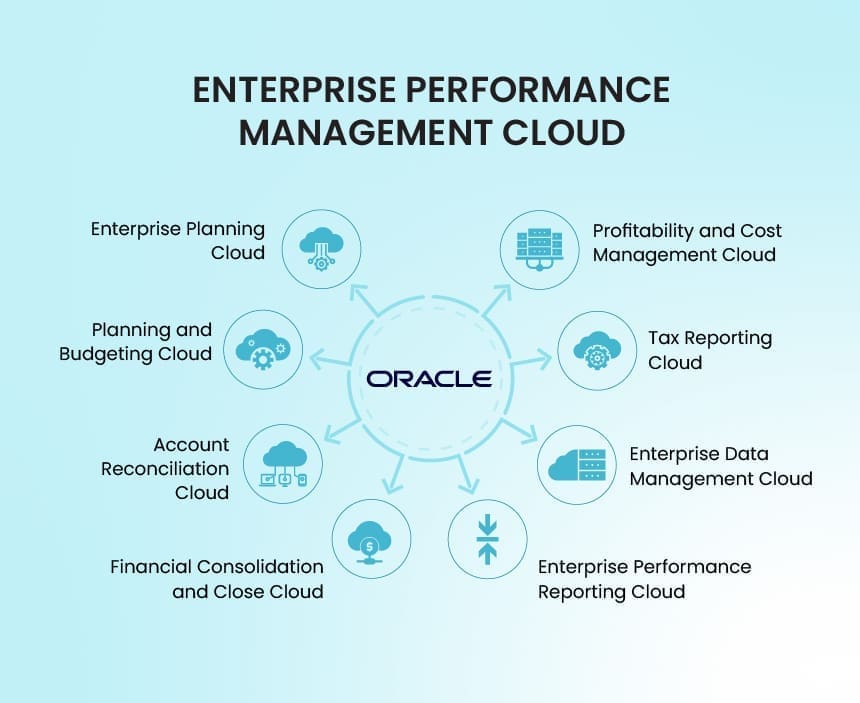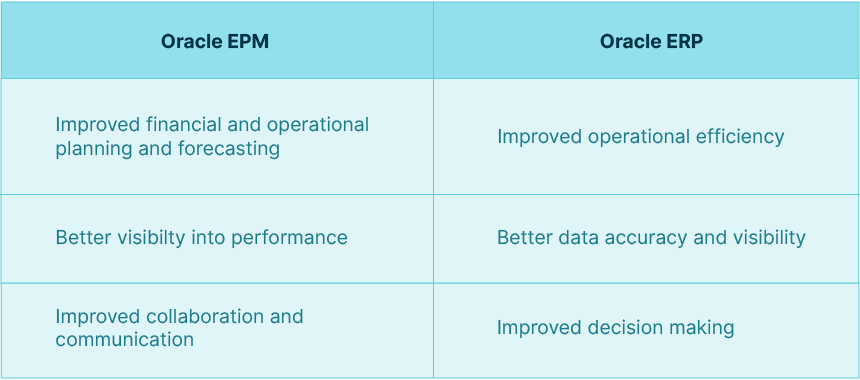Enterprise performance management (EPM) software allows for efficient budgeting, forecasting, and financial management. Over the last two decades, EPM software platforms have evolved from Windows-based client/server systems to web browser-based applications. There’s a robust strong demand for modern, Cloud-based EPM software that can streamline operations like financial close.

What is Oracle EPM?
Oracle Cloud EPM is a Cloud-based enterprise performance management platform that enables organizations to respond quickly to financial demands in a changing regulatory environment. Designed for large multinational organizations, EPM supports financial consolidation, tax reporting, and enterprise data management.
Oracle EPM allows organizations to adapt quickly to new requirements and deliver faster, more accurate insights to all stakeholders. EPM leverages automation, tax provision, tax reporting, and other capabilities to keep your business compliant in a dynamic marketing landscape.
Specific types of EPM services include:
- Enterprise Planning and Budgeting Cloud Service (EPBCS)
- Financial Consolidation and Close Cloud Service (FCCS)
- Account Reconciliation Cloud Service (ARCS)
- Enterprise Performance Reporting Cloud (EPRCS)
- Enterprise Data Management Cloud (EDM)
Oracle Enterprise Performance Management (EPM) Vs. Oracle Enterprise Resource Planning

Learn more: What is Oracle EPM
Why do EPM Cloud apps require extensive testing?
Oracle Cloud Enterprise Performance Management, is a Cloud-based single platform that eliminates the need for users to save the program on their own server and gives them access to it from anywhere at any time. Additionally, the cloud-based approach offers automatic updates, which motivates businesses to continue using newly released features and functionalities every month.
“According to projections, the size of the enterprise performance management market would increase at a compound annual growth rate (CAGR) of 9.50% from USD 6.88 billion in 2023 to USD 10.83 billion by 2028. “
Oracle Hyperion is the on-premise version of Oracle EPM. Oracle terminated Premier support for Oracle Hyperion 11.1.2.X in December 2021, with no option for extended support. As a result, enterprises using it have to migrate to the Oracle EPM Cloud. Oracle EPM promises ongoing innovation through its monthly updates in addition to its many advantages, which include cheap cost of ownership, data security, real-time access to data, scalability, and flexibility.
The benefits of Oracle EPM Cloud monthly upgrades are undeniably numerous – new features, functionality, and bug fixes—but they come at a cost and with responsibilities. Anyone in charge of administering and supporting Oracle Cloud apps in a firm must grasp the significance of testing. In fact, IT managers in charge of Oracle EPM Cloud app management and support must “continuously test” the monthly Oracle EPM Cloud updates to ensure that updates have not inadvertently introduced bugs or code changes that will have a negative impact on system performance or user experience.
This article will go over the significance of testing during Oracle Cloud EPM updates. We’ll also go over the difficulties that IT Managers/Testing managers may face during Oracle Cloud EPM testing.
Understanding Oracle Cloud EPM Monthly Updates
Oracle enterprise performance management monthly updates consist of a patch containing bug fixes, code optimization, and feature updates. The patch is usually done on the first Friday of the month for test environments during the next daily maintenance window. Patches for production environments are done on the third Friday of the month.
Monthly update schedule
- Test Environments: Oracle will apply this monthly update during the first Friday of the month. In the case of this month (as-of writing this blog), it will occur at or after 22:00 UTC on Friday, December 1, 2023.
- Production Environments: Oracle will apply this monthly update during the third Friday of the month. It will occur at or after 22:00 UTC on Friday, December 15, 2023.
Why Is There a Need for Oracle EPM Cloud Monthly Update Testing?
Oracle Cloud EPM monthly updates have the potential to affect a variety of functionalities. If you decide to enable a new feature, you must understand how it will affect current business processes and procedures. It’s possible that a bug repair could negatively affect your business processes or that a new bug could be introduced. Because downstream issues can have a significant impact on operational efficiency, even minor adjustments must be tested.
What should you test?
- Test all critical business functions before the patches go into production.
- Test key business process flows for different roles in the organization.
- Critical custom reports and integrations with other applications.
- Custom workflows. (journal, invoice, PO approval, etc.)
- Automatically available UI and process new features that will apply to you.
However, Oracle Cloud EPM Testing Is Complicated and Chaotic
[A] Covering generic issues
Though manual testing is still prevalent, it cannot be considered a viable solution. You struggle to achieve the required levels of testing speed, coverage, and accuracy to keep pace with Oracle EPM Cloud monthly updates.
- Monthly releases – Doing regression testing manually at least 12 times/year to perform functional and technical analysis for each Oracle EPM Cloud release to understand its impact on the environment is not a viable solution.
- Short testing window – Organizations get only two weeks’ time to execute testing, analyze the results, & validate critical business processes. Manually doing this across the length and breadth of the EPM ecosystem can be challenging.
- Inadequate resources – Enterprises often struggle to test EPM Cloud because of the amount of time and resources required, along with hardware needed for proper testing.
- Inaccuracy – Manual testing can negatively impact business continuity because of its inability to scan and identify patterns impacting business processes’ performance.
- Less agility – Instead of actually testing the apps, enterprises frequently dedicate 50% or more of their time on tasks like setting up hardware, setting up application test environments, testing tools, etc. This results in increased risks and lower-quality applications.
[B] Covering Technical Aspects
Enterprises that want to bring in test automation need to analyze the technical aspects of Oracle Cloud enterprise performance management testing.
- Script maintenance – Oracle releases monthly updates. If test scripts don’t automatically adapt to the changes, it will lead to test inability.
- E2E integration testing – Oracle EPM cloud apps are highly customizable and can be integrated seamlessly with third party applications. It is possible for certain customisations and integrations to break during upgrades.
Apart from keeping the above-given points in mind, enterprises need to realize that more frequent updates mean more frequent testing. Testing comes at a certain cost, as you need resources as well as a test environment to test Oracle EPM applications. You require a solution that not only provides real-time change updates but also accelerates execution while keeping costs under control.
Opkey for Oracle Cloud EPM Testing
Opkey is an expert in ERP and Oracle Cloud EPM testing. Our assistance has enabled well-off enterprises such as Cigna and Haemonetics Corporation to minimize the amount of time they spend testing Oracle Cloud EPM updates. Opkey’s EPM-based scripts expedite the implementation of an automated regression testing procedure to shorten the monthly regression testing completion time.
- An extensive library of over 5,000 Oracle Cloud pre-built tests allows for speedy onboarding.
- Automated Impact Analysis, which is available following each Oracle update. As a result, the team can immediately identify any affected parts of the testing program.
- A no-code platform that is simple enough for all users (rather than only technical QA resources).
- Self-healing capabilities that ensure impacted test scripts are automatically repaired following each EPM update.








